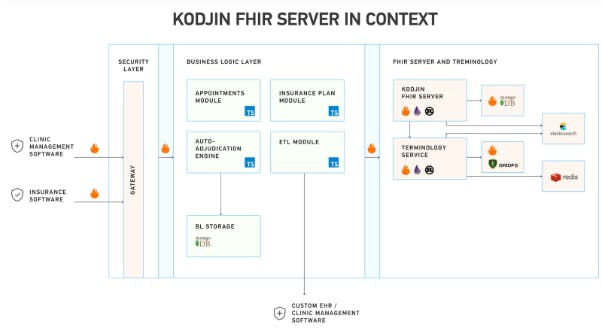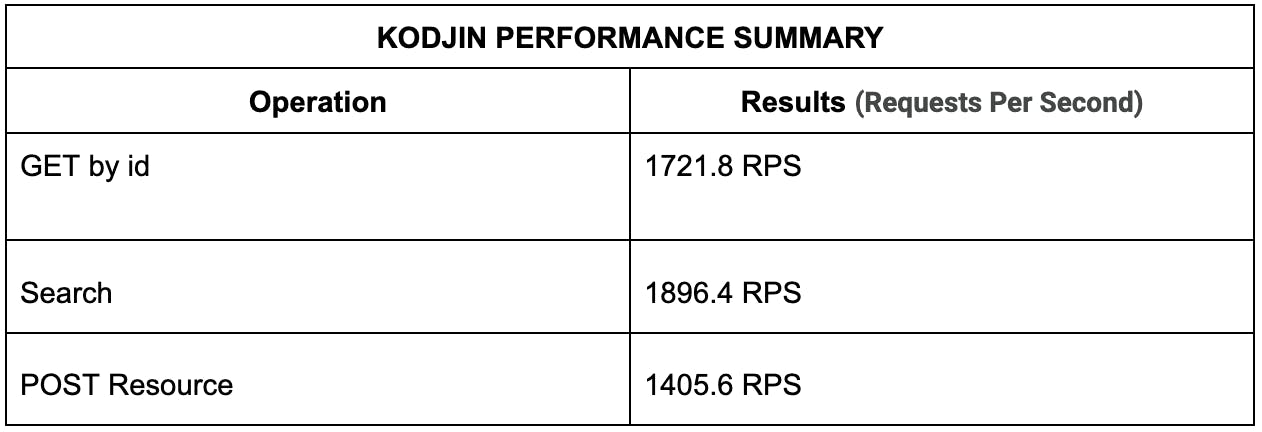The Kodjin FHIR server has speed and scale in its DNA.
Edenlab, the Ukrainian company behind Kodjin, built our original FHIR solution to digitize and service the entire Ukrainian national health system. The learnings and technologies from that project informed our development of the Kodjin FHIR server.
At Edenlab, we have always been driven by our passion for building solutions that excel in speed and scale. With Kodjin, we have embraced a modern tech stack to deliver unparalleled performance that can handle the demands of large-scale healthcare systems, providing efficient data management and seamless interoperability.
”Built for speed and scale
While most healthcare projects involve handling large volumes of data, including patient records, medical images, and sensor data, the Kodjin FHIR server is based on a system developed to handle tens of millions of patient records and thousands of requests per second, to ensure timely access and efficient decision-making for a population of over 40 million people. And all of this information had to be processed and exchanged in real-time or near real-time, without delays or bottlenecks.
This article will explore some of the architectural decisions the Edenlab team took when building Kodjin, specifically the role MongoDB played in enhancing performance and ensuring scalability. We will examine the benefits of leveraging MongoDB's scalability, flexibility, and robust querying capabilities, as well as its ability to handle the increasing velocity and volume of healthcare data without compromising performance.
About Kodjin FHIR server
Kodjin is an ONC-certified and HIPAA-compliant FHIR Server that offers hassle-free healthcare data management. It has been designed to meet the growing demands of healthcare projects, allowing for the efficient handling of increasing data volumes and concurrent requests.
Its architecture, built on a horizontally scalable microservices approach, utilizes cutting-edge technologies such as the Rust programming language, MongoDB, ElasticSearch, Kafka, and Kubernetes. These technologies enable Kodjin to provide users with a low-code approach while harnessing the full potential of the FHIR specification.
A deeper dive into the architecture approach - the role of MongoDB in Kodjin

When deciding on the technology stack for the Kodjin FHIR Server, the Edenlab team knew that a document database would be required to serve as a transactional data store.
In an FHIR Server, a transactional data store ensures that data operations occur in an atomic and consistent manner, allowing for the integrity and reliability of the data. Document databases are well-suited for this purpose as they provide a flexible schema and allow for storing complex data structures, such as those found in FHIR data.
FHIR resources are represented in a hierarchical structure and can be quite intricate, with nested elements and relationships. Document databases, like MongoDB, excel at handling such complex and hierarchical data structures, making them an ideal choice for storing FHIR data.
In addition to supporting document storage, the Edenlab team needed the chosen database to provide transactional capabilities for FHIR data operations. FHIR transactions, which encompass a set of related data operations that should either succeed or fail as a whole, are essential for maintaining data consistency and integrity. They can also be used to roll back changes if any part of the transaction fails.
MongoDB provides support for multi-document transactions, enabling atomic operations across multiple documents within a single transaction. This aligns well with the transactional requirements of FHIR data and ensures data consistency in Kodjin.
Implementation of GridFS as a storage for the terminologies in Terminology service
Terminology service plays a vital role in FHIR projects, requiring a reliable and efficient storage solution for terminologies used. Kodjin employs GridFS, a file system within MongoDB designed for storing large files, which makes it ideal to handle terminologies.
GridFS offers a convenient way to store and manage terminology files, ensuring easy accessibility and seamless integration within the FHIR ecosystem. By utilizing MongoDB's GridFS, Kodjin ensures efficient storage and retrieval of terminologies, enhancing the overall functionality of the terminology service.
Kodjin FHIR server performance
To evaluate the efficiency and responsiveness of the Kodjin FHIR server in various scenarios we conducted multiple performance tests using Locust, an open-source load testing tool.

One of the performance metrics measured was the retrieval of resources by their unique ids using the GET by ID operation. Kodjin with MongoDB achieved a performance of 1721.8 requests per second (RPS) for this operation. This indicates that the server can efficiently retrieve specific resources, enabling quick access to desired data.
The search operation, which involves querying ElasticSearch to obtain the ids of the searched resources and retrieving them from MongoDB, exhibited a performance of 1896.4 RPS. This highlights the effectiveness of polyglot persistence in Kodjin, leveraging ElasticSearch for fast and efficient search queries and MongoDB for resource retrieval. The system demonstrated its ability to process search queries and retrieve relevant results promptly.
In terms of resource creation, Kodjin with MongoDB showed a performance of 1405.6 RPS for POST resource operations. This signifies that the system can effectively handle numerous resource-creation requests. The efficient processing and insertion of new resources into the MongoDB database ensure seamless data persistence and scalability.
Overall, the performance tests confirm that Kodjin with MongoDB delivers efficient and responsive performance across various FHIR operations. The high RPS values obtained demonstrate the system's capability to handle significant workloads and provide timely access to resources through GET by ID, search, and POST operations.
Conclusion
Kodjin leverages a modern tech stack including Rust, Kafka, and Kubernetes to deliver the highest levels of performance. At the heart of Kodjin is MongoDB, which serves as a transactional data store. MongoDB's capabilities, such as multi-document transactions and flexible schema, ensure the integrity and consistency of FHIR data operations. The utilization of GridFS within MongoDB ensures efficient storage and retrieval of terminologies, optimizing the functionality of the Terminology service.
To experience the power and potential of the Kodjin FHIR server firsthand, we invite you to contact the Edenlab team for a demo.
For more information On MongoDB’s work in healthcare, and to understand why the world’s largest healthcare companies trust MongoDB, read our whitepaper on radical interoperability.